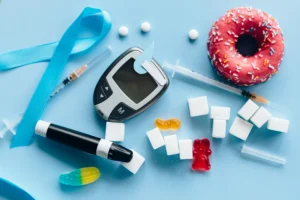Diabetic Emergencies in Jails

On any given day, a headache, feeling thirsty, or even urinating more than usual is unlikely to cause alarm. Many will reach for over-the-counter (OTC) medications or take some time to rest. For diabetics however, these common symptoms can be early signs of an impending diabetic emergency, and need to be addressed quickly.
Diabetic Emergencies
Understanding potential symptoms can help diabetics recognize when something is wrong, but if they can’t get treatment quick enough, then diabetic emergencies can occur. The two primary types of emergencies are:
- Hypoglycemia – Occurs when blood sugar levels are too LOW
- Can lead to passing out, having a seizure or entering a diabetic coma
- Hyperglycemia – Occurs when blood sugar levels are too HIGH
- Can lead to vomiting, difficulty breathing or even death
Both hyperglycemia and hypoglycemia can come on suddenly, or symptoms can be mistaken for other medical conditions. This can be particularly harmful in a jail setting where the inmate has less resources to self-manage or seek medical care.
Another risk for diabetic emergencies occurring in jail is that many factors that can worsen blood sugar control can also occur while incarcerated. Less control over their activity levels, food, stress and overall wellness can make it harder for diabetics to self-manage their condition.
Factors that can affect blood sugar regulation include:
- More exercise or physical exertion than usual
- Drinking alcohol
- Skipping a meal or eating less than usual
- Changes to medications
- Being sick or stressed
- Chronic or Acute medical issues such as strokes or pancreatitis
- Physical injuries
- Taking too much or too little insulin
- Too many, or too few carbohydrates
- Changes in weather or routine
- Menstruation
When jails fail to address these contributory factors, it can make managing blood sugar levels even harder. This, coupled with mismanaged diabetic care in the federal prison system, has been said to potentially be making inmates’ condition (i.e., diabetes) worse. Others note that adequate diabetic care in jail is possible, but suggest that more research or policy changes are needed.
Recognizing Diabetes Symptoms
Prompt access to diabetic care is incredibly important, and inmates need to consider self-advocating for this care when able. This can be by educating themselves and others on the symptoms that occur with low- and high-blood sugar. It could also be paying close attention to their overall health. In some instances, it will be important for them to communicate their needs to others, such as during a lockdown or other emergency at the facility.
Bystanders and jail staff need to be aware of an inmates condition when symptoms start to worsen, and understand the importance of providing prompt medical treatment. Without a shared awareness, it can be even harder for these symptoms to be recognized and treated quickly in a jail setting.
Low Blood Sugar (Hypoglycemia)
- Common Low Blood Sugar symptoms: Dizziness, being hungry, sweating, shaking, nervousness, a fast heartbeat, feeling weak, irritability or confusion.
- Severe Low Blood Sugar symptoms: Clumsiness, disorientation, slurred speech, double vision (or blurred vision), seizures and a loss of consciousness.
Complications of low blood sugar, particularly if not treated promptly, can include development of organ failure, brain damage, cardiac problems or even death.
High Blood Sugar (Hyperglycemia)
- Common High Blood Sugar symptoms: Blurred vision, a headache, frequent urination and thirst.
- Long term symptoms of hyperglycemia include: fatigue, skin infections, weight loss, slow-healing wounds, and vaginal yeast infections.
- Repeated or prolonged high blood sugar can affect a number of organs in the body, and cause issues such as neuropathy, heart disease, retinopathy, stroke, gastroparesis or nephropathy.
Severe high blood sugar is a particularly dangerous condition resulting in Diabetic Ketoacidosis (DKA). The levels of sugar and ketones in your blood rise, which makes the blood acidic. This condition can become a true emergency very quickly, and also result in a coma or death.
- Diabetic Ketoacidosis (DKA) symptoms: Nausea and vomiting, fruity smelling breath, abdominal pain, rapid heartbeat, labored breathing, dehydration, confusion, disorientation and a loss of consciousness.
Missing Diabetic Emergencies in Jail
A challenge in recognizing diabetic symptoms is that they also are commonly experienced with other medical conditions. This similarity can unfortunately result in slow responses to true diabetic emergencies. In both the jail and prison system, there are a number of examples highlighting this problem.
- Inmates assumed to be detoxing, suicidal or in a mental health crisis
- Often occurs when inmates beome disoriented or confused, are vomiting, urinating or defecating
- Loss of consciousness or lethargy attributed to other causes
- Inmates are left alone in cells or not attended to, and discovered to have missed receiving insulin or other medications
- Inmates are at the mercy of medical staff and jail schedules to receive insulin.
- Often they can’t self-administer their insulin to coordinate with meal schedules, and can receive high-carb meals that spike blood sugar levels
- A lack of monitoring or access to medications while in solitary confinement
- Delirium or erratic behavior assumed to be from drug use (or suspected drug use) instead of problems with blood sugar regulation
Many, if not all of these were avoidable tragedies and a number of organizations are pushing for better standards of care. In the meantime though, inmates and their families are still the best advocate for diabetic care. If you want to read more about how diabetes can and should be managed while incarcerated, check out some of our other articles that summarize recent research and policy statements affecting diabetic inmates.
- How Should Diabetes be Managed in Jail?
- Legal Options for Diabetics in Jail
- Problems for Diabetics in Jail
If you or a loved one has experienced challenges with receiving proper diabetic care while in jail, consider reaching out to one of our experienced attorneys.

